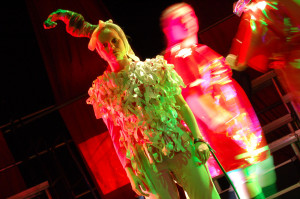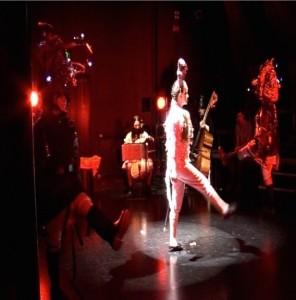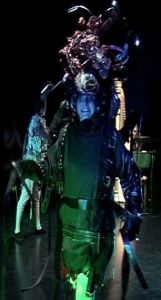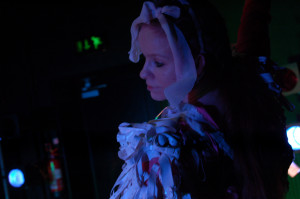Alexandra Vinson Professor, Medical Social Science, USA
Butcher offers the audience an opportunity to see breast cancer through a kaleidoscope: different women’s perspectives on the meaning of cancer, cancer treatment and the bodily changes that cancer treatment entails. Butcher, however, does not end there. After situating the action in the life of one woman, the play zooms out to examine breast cancer as only one of the myriad ways in which Medicine takes hold of women’s bodies. Butcher uses the experience of breast cancer to comment on the complex of actors and motivations that coalesce around women’s bodies and draws on the popular metaphor of cancer treatment as war to link to larger issues of militarization in Medicine/ against bodies. By far the most compelling aspect of the play is the Butchers themselves; these two characters are conglomerations of all of the actors in breast cancer treatment: the surgeons (portrayed as the car mechanics of the body), the pharmaceutical companies, the government and policymakers.
Butcher is a strong effort and the performance of the play seemed to meet a lot of the authors’ goals.
If this play is taken forward and re-worked for a second production, I would recommend that the authors’ time be spent strengthening the transition moments from the individual stories of the women that begin the play to the large-scale social critique at the end of the play. Audience members with experience in the critical social sciences and social theory will make the leap, but perhaps it is most important that the audience members unfamiliar with such a perspective are carefully guided to the critique.
Unlike many plays I have seen, Butcher offers the opportunity for a social critique that portrays what it describes: the multi-national political and economic forces that embed themselves in womens’ bodies through the hands of Medicine, and the varying ways women themselves recognise (or not) these forces.
Muirelle Wilson TV Producer
I thought the concept of the production was a very brave and well-informed idea, which has certainly had an impact on the way I think and accept cancer charities and treatments.
The performance was lively and very emotional at times. I think the intimacy we had with the performers and other audience members was very powerful as viewers could see reactions on lots of different levels.
I have always believed that life change (diet and exercise etc) can aid healing and prevent illness which is discussed in Butcher but I kind of just accepted that preventative surgery was the norm and had never really thought about the propaganda that surrounds these issues; it makes complete sense especially with regards to monetary gain for pharmaceutical manufacturers.
I think some individuals will find this very difficult to accept, as we all like to believe that the Caring Profession has our well-being at the forefront.
The use of the orchestra in the space was great; it all felt very inclusive and alive.
I loved the headpieces; they really did help the cast interact with the audience and also physically elevate their position in relation to the patient.
There was obviously a great deal of blood sweat and tears that’s gone into this production, it is good to see performances that focus on women and empowering women with knowledge and honesty.

Megan Broadmeadow Sculptor and Performance Artist, The Slade School of Fine Art, UCL and Goldsmiths, London
I found ‘Butcher’ to be a unique experience in terms of its aesthetic presence and the bravery of the work which tackled a difficult and uncomfortable subject with no holds barred.
At the performance’s core was a grotesque playfulness which was echoed in the text, songs and costumes. As a performance about doctors, hospitals and operations, the dark and painful topics were brought to life through creation of a surreal world where adults played in a regressed childlike state not unlike an elaborate game of doctor’s and nurses.
This production was tackling many taboos: death, cancer, mutilation, and also taboos of global dominance of health care by monopolizing pharmaceutical companies.
The use of foul language was at first overwhelming and seemed gratuitous or limiting to the work, but in thinking about it the use of foul language was integral to the work for its stance in fighting taboos. For me the swearing was a device to trick the taboo’s, by using antisocial language associated with the subject it somehow devalues the taboo in question and in this performance made it vulnerable and less threatening. By ridiculing the fear it allowed the audience to question why the taboo is held in such high esteem in the first place and let them feel ok about challenging the way things are done. The songs and acoustic live musical score were also surprisingly on track to meet with the tough language and really brought the work to life as a macabre carnival.
The costumes and props were a great strength in the production and really brought in an interesting dynamic it terms of sculpture being re-interpreted into a theatrical context. The use of the sculptural object was particularly relevant given the subject matter and the objectification of womens’ bodies in the script.
The all female cast gave it a feminist slant, which I wonder was of benefit to the work. I think the inclusion of male actors into the work could have added extra dynamics and power relations into the work which could have provided solutions of real menace and darkness.
There were also times when the message felt a little repeated, and I feel as the company develops with future work they will find ways to become more concise with editing the work. I’d also have liked to see more physicality in the work, and cleaner ways for the actors to change from one costume to another, as I think working with the forms of the body could work very well with the sculptural nature of the costumes and sets.
As first production I can only admire the effort, determination and detail that went into the work, I was excited and challenged by it and it still stays in my memory as something imaginative and unique, and I can’t wait to see what the next work will be!
The production made me realise the exciting possibilities that theatre itself has as vehicle for questioning what society see as normal practice in the medical sector.
I think this was an innovative project in its use of theatre as space for challenging legislation and a belief system, and its visceral nature felt like a far more effective way of raising debate than say the conventional forms of a TV documentary, or news article.
Chris Bird-Jones Artist and Lecturer, Swansea Metropolitan University
Still almost a taboo subject, the uncomfortable notion of mastectomy, other bodily severances and addition of appendages made this a thought provoking, visually exciting production.
The close proximity of the actresses and musicians, the stage-set, sculptural props and lighting all combined to create a ‘moving’ installation.
The music cemented the dialogue and played on the ‘nausea of music hall’. Moments of humor gave welcome relief.
Following this debut I wonder what Asking4It Productions will do next?

Albeniz Clayton Artist and Poet, Oxford
A performance with a strong text/ subject medical-social that attempts to elucidate aspects and issues that anticipates cancer prognostics in health and to sell medical operations (commercial operations?) to women.
Butcher explores the extirpation of organs from the female body as a popular belief that a cure exists before the malady.
The business hidden within all the medical procedures and diagnostics as money machine and maintain the female body as main victim and source of profits in the medical market.
Despite sometimes being slightly pamphleteered it is compensated by the funny ambiance, like a dark comedy.
With the actors playing as performers carrying on drama and visual theatre, the nonsense is intensely juxtaposed with the reality of surgery department in most of the hospitals in our time.
Shame that the musicians were not interactive most of the time with the actors and with the whole process. Watching them waiting to play was a bit disappointing.
I think Jane Fox and Susan Jickells were extremely brave and also the troupe showing a sad, confusing and surreal reality where women are victim but also any human being that trusts any kind of uncertain ideology.
The show reveals through a “musical happening” that medical ideology transforms human beings into merchandise or pure flesh. A pure flesh for cannibals
Asking4It Productions are archived at intervals by The National Library of Wales since 2016.
Copyright Asking4It Productions. All Rights Reserved 2022





![Lottery_landscape_black[1].jpg (1)](http://asking4itproductions.co.uk/wp-content/uploads/2017/05/Lottery_landscape_black1.jpg-1-300x76.jpg)





